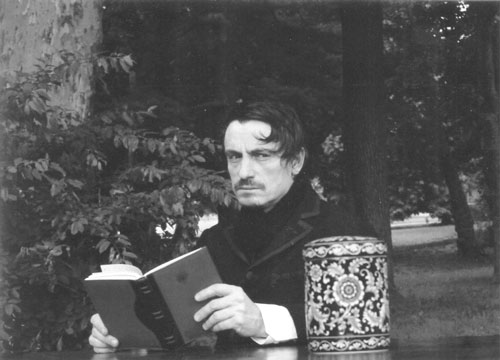By Aileen Torres
There is a scene in “The Journey of the Fifth Horse” which takes place in the imagination of one of the two main characters, the conjured protagonist, Nikolai Alexeevich Chulkaturin (played by Ledger Free). He bumbles into the middle of a casual social gathering at the house of the father of the girl with whom he is in love. He holds a white rose in one hand, intending, of course, to present it to the object of his affection, 17-year-old Elizaveta Kirillovna (Kim Clay), who reciprocates his amorous feelings—up till that point, that is.
Unfortunately for the soft-spoken, self-effacing Chulkaturin, the dashing, young Captain Ivan Petrovich Narvinsky (Duke York) has just arrived in St. Petersburg, Russia, armed with a broad chest, tall height and courtly demeanor that perfectly suits his scarlet uniform. In short, he is everything that Chulkaturin is not, and Elizaveta, being young and impressionable, becomes captivated with the soldier as he proceeds to converse with ease and confidence, while Chulkaturin sits mute and uncomfortable, a mere observer rather than a participant.
“And so you see what it is to exist as an interruption,” he says as an aside.
An interruption is not only something unnecessary, but also something unwanted, which, in essence, sums up the characters Chulkaturin and Zoditch (Dan Patrick Brady) in Ronald Ribman’s “Journey,” which won the 1965-66 Obie (Off-Broadway Theater Award) for Best American Play. It is partly based on “The Diary of a Superfluous Man,” a short story by Ivan Turgenev.
A 17-member non-profit theatre ensemble, Smatter, is presenting the current revival, directed by Christina Cass and running approximately two-and-a-half hours, at Access, a 64-seat theater housed in the fourth floor of a former textile warehouse.
Access Theater was founded in 1992 by Jacqueline Christy, its artistic director. At the time, Tribeca was marginally a neighborhood, and the downtown theatre scene was not yet widely acknowledged.
Christy decided to name the theater “Access” because she was once a manufacturer of access doors.
“Those funky metal doors that lead to the basement of delis,” she explained. “You step over them on the sidewalk,” added Producing Director Margarett Perry, who has been running Access since 2000.
Perry was previously a general manager at Chelsea Piers. Access does one to three productions per year, “depending on the financial situation,” Perry said. Among the plays they have produced are “Strangerhorse,” by Brian Dykstra, in April 2002 and “3:00 in Brooklyn,” by Isralea Maraglit, which broke box-office records for the theater in Fall 2002.
According to Perry, Access is devoted to producing new plays, although she made an exception for “Journey” because she “really liked Christina [Cass] and felt that the play was really unproduced in New York.”
The play opens at the Grubov publishing house in mid-19th century St. Petersburg. Two servants of the recently deceased landowner, Chulkaturin, have come to try to sell a manuscript by their former master, even though he had explicitly asked for his personal writings to be destroyed upon his death.
The reader assigned to peruse the diary is an irascible man named Zoditch. Clad in an ill-fitting suit, too loose for his slight, 5’4” body, he takes the papers to his small apartment and sets about his task grudgingly. The melancholy story of Chulkaturin’s encounter with love then unfolds on stage through Zoditch’s imagination, with the reader becoming increasingly drawn into the tale, which parallels his own struggle to capture the heart of his miscreant landlady. Both men are trapped in their respective cages of loneliness.
Journey takes its title from a scene in the play. A pithy tale is told about a driver who adds a fifth horse to his team. The animal turns out to be an unnecessary addition. He performs his duty, but he is superfluous. On his deathbed, Chulkaturin, febrile, addresses God with a bitter exclamation: “Have you not made me a fifth horse?… To whose benefit do I run?”
There is a difference between Chulkaturin and Zoditch in their attitudes toward the bleak lot that befalls them. Although Chulkaturin is bitter at first, specifically toward Capt. Narvinsky for winning over the affection of Elizaveta, he eventually accepts his fate of isolation. He is a nice guy, after all, which comes across clearly through Free’s deft portrayal.
Zoditch, on the other hand, harbors a persistent, gnawing anger at all of his misfortunes, including financial ones. His lascivious nature is evident in his vivid sexual fantasies and constant obsession with money and property. Brady brings the disheveled character to life by expertly giving signs of Zoditch’s mounting desperation, hinting at an emotional climax of madness born of loneliness and destitution.
The supporting cast also complements the tight script, with Lou Tally and Asta Hansen providing a bit of comic relief as the husband-and-wife team of Kirilla Matveich Ozhogin and Anna. Smatter’s revival production of “Journey” is worth seeing for its compelling performances that animate a touching story that is itself a statement on the necessity of love in an individual’s life.






























